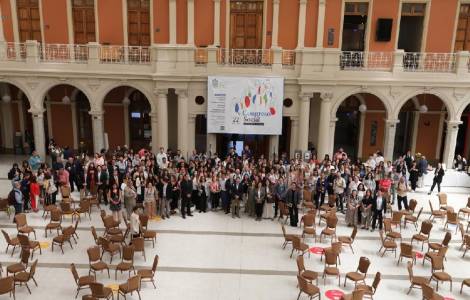
Santiago (Agenzia Fides) - There are two very useful instruments in democracy to confront and present ideas: debate and dialogue. The debate has one goal, which is to win. One wants to win an argument, so he tries to convince the other, he opposes, he looks for the opponent's weak argument. Dialogue is very different, because the goal is not to win, but to understand. One tries to find a way to explain himself and asks the other to explain himself, he looks for a way to listen and for the other to listen. It takes self-discipline, tolerance, and resilience to listen to things that can be quite uncomfortable. These are the concepts highlighted by Alfredo Zamudio, director of the Chile Mission of the Nansen Center for Peace and Dialogue, at the inaugural conference of the VI Social Congress UC (Catholic University of Chile), organized by the Direction of Pastoral Care and Christian Culture. Zamudio insisted on the need to build a shared future, in which there is not necessarily unity, but where diversity can be shared. The meeting, oriented to the "Dialogue for Unity", and was attended by about 300 people from 100 civil society organizations, including foundations, institutions and companies, who wanted to explore the issues that mark national life and, to the light of the social doctrine of the Church, identify the ways to build a better country. In this context, the Rector of the UC, Ignacio Sánchez, underlined the importance of promoting this type of meeting: "Our public role as a university is manifested in the capacity of our institution to promote and strengthen dialogue in our country. This is very necessary for our society. In this sixth edition of the Congress we want to respond to the invitation of Pope Francis when he visited Chile and asked us to dialogue for unity. For this reason, I want to invite you in this Congress to establish a dialogue for unity, for our country and for the university". Cardinal Celestino Aós, Archbishop of Santiago and Grand Chancellor of the UC, led the recitation of the Prayer for Peace attributed to St. Francis of Assisi, and underlined: "St. Francis of Assisi grew in his love for the Church and for society, and became a peacemaker and instrument of peace. That is why we know that intelligence is not enough. If we really want to dialogue, we have to start spending a lot of time looking at Jesus on the cross, praying. Without this, we will not be able to open our hearts". The Congress was divided into three thematic panels which guided the reflection on the most urgent needs: "Craftsmanship of peace", "Recognition of a 'we'" and "Towards a shared human project". In addition, some topics were proposed to be discussed in small groups of eight people. In the exchange of experiences, among other topics, civic friendship, migration, social economy, integral ecology, etc. were addressed. Father Jorge Merino, Major Chaplain of the Pontifical Catholic University of Chile, highlighted the atmosphere and attitude of the participants: "With great joy, we saw many people participating; we saw that there was a desire to share, to learn, to dialogue to build peace and unity". He then reiterated the role of the university in this context: "We echo the words of Pope Francis when he says that the University must offer a contribution to society. Today we see that in Chile a lot of dialogue is needed, a lot of unity is needed and, therefore, with simplicity on the part of the University, guided by the Pastoral care, we want to contribute to promoting dialogue". Benjamin Cruz F., Director of the UC Pastoral Care, stressed that it was the first time that the Congress was once again in person: "It was precious to meet again, to regenerate networks and ties between institutions and people. The great challenge with which we leave this congress is the desire to contribute to Chile, to contribute to a more just and fraternal society". "This year's congress is very relevant to the context in which we live socially, politically and culturally. This is a very strong response, not only to continue the dialogue, but also to mobilize for action". The reflections and commitments resulting from the VI Social Congress of the UC will be collected in a digital book. More than two months after the plebiscite that rejected the draft of the new Constitution, Chile continues to experience a deep political, social and economic crisis that affects people's daily lives and has caused deep rifts in society (see Fides, 15/11/2022; 22/11/2022) (SL) (Agenzia Fides, 24/11/2022)
 ASIA/VIETNAM - Vietnamese Catholic communities stand alongside women in need to combat mass abortion
ASIA/VIETNAM - Vietnamese Catholic communities stand alongside women in need to combat mass abortion